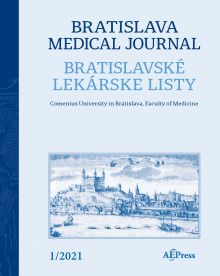Journal info
|
||||
Select Journal
Journals
Bratislava Medical Journal 2024 2023 2022 2021 2020 2019 2018 2017 2016 2015 2014 2013 2012 Ekologia - Ecology Endocrine Regulations General Physiology and Biophysics Neoplasma Acta Virologica Studia Psychologica Cardiology Letters Psychológia a patopsych. dieťaťa Kovove Materialy-Metallic Materials Slovenská hudba 2025Webshop Cart
Your Cart is currently empty.
Info: Your browser does not accept cookies. To put products into your cart and purchase them you need to enable cookies.
Bratislava Medical Journal Vol.121, No.2, p.122–128,2020 |
||
| Title: Apoptotic effects of thymol, a novel monoterpene phenol, on different types of cancer | ||
| Author: H. Elbe, G. Yigitturk, T. Cavusoglu, Y. Uyanikgil, F. Ozturk | ||
| Abstract: BACKGROUND: Cancer is a major public health problem in many areas of the world. Many anticancer drugs in current clinical use have been isolated from plant species or are based on such substances. Thymol (5-methyl-2-isopropylphenol) is an oxygenated aromatic compound from monoterpene group. It is the main constituent of thyme essential oil and shows antioxidant, antiseptic and antiproliferative properties. The aim of this study is to determine the antiproliferative activity and apoptotic effect of thymol on prostate cancer (PC-3, DU145), breast cancer (MDA-MB-231), and lung cancer (KLN205) cell lines. METHODS: The cancer cells were treated with different concentrations of thymol (100, 200, 400, 600, 800 µM) at 24 h, 48 h and 72 h. The cell viability was investigated by MTT assay and analysis of apoptosis was determined with annexin V assay. RESULTS: The study showed the dose and time-dependent cytotoxic effect of thymol in PC-3, DU145, MDA-MB-231, and KLN205 cancer cell lines. Thymol significantly induced apoptosis in all groups in a dose-dependent manner. Statistical analysis showed a significant difference between thymol‑treated cell lines compared to the control (p < 0.001). CONCLUSION: The data in the present study demonstrated that thymol has apoptotic and antiproliferative properties in lung, breast and prostate cancer cell lines. Thymol could serve as a potential therapeutic agent in the future (Fig. 5, Ref. 26). |
||
| Keywords: apoptosis, thymol, cancer, antiproliferative | ||
| Published online: 22-Jan-2020 | ||
| Year: 2020, Volume: 121, Issue: 2 | Page From: 122, Page To: 128 | |
| doi:10.4149/BLL_2020_016 |
||
|
|
 download file download file |
|

